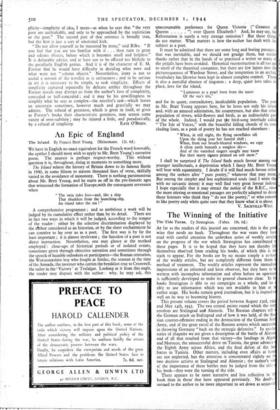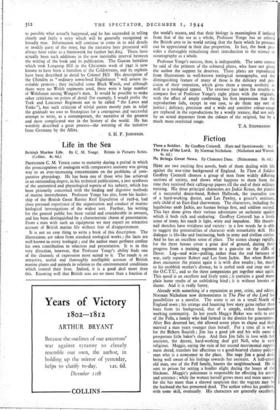The Winning of the Initiative
The Tide Turns. Ey Strategicus. (Faber. 10s. 6d.)
As far as the readers of this journal are concerned, this is the g wine that needs no bush. Throughout the war years they hay read with careful attention the unbroken series of weekly articl on the progress of the war which Strategicus has contributed t these pages. It is to be hoped that they have not thereby fel themselves absolved from reading his books, of which this is th sixth to appear. For the books are by no means simply a re-ha of the weekly articles, but are completely different from them method of treatment. The weekly articles represent the immedia impressions of an informed and keen observer, but they have to written with incomplete information and often before an operat is sufficiently developed to make its general character clear. In hi books Strategicus is able to see campaigns as a whole, and he able to use information which was not available to him at earlier stage. His books remain good journalism, but it is journals well on its way to becoming history. • This present volume covers the period between August 23rd, 19 and May 14th, 1943. The two central points round which the sto revolves are Stalingrad an Alamein. The Russian chapters tell the German attack on Stalingrad and of how it was held, of the Ru sian counter-offensive ending in the dcstruction of the German Six Army, and of the great recoil of the Russian armies which succeed in throwing Germany " back on the strategic defensive." In anoth series of chapters we are given a description of the battle of Alain and of all that resulted from that victory—the landings in Alg and Morocco, the unsuccessful drive on Tunisia, the great advance the Eighth Army across Africa, and the final defeat of the forces in Tunisia. Other matters, including even affairs at ho are not neglected, but the attention is concentrated rightly on e two decisive actions at Stalingrad and Alamein ; the author's vi of the importance of these battles may be judged from the title his book—they were the turning of the tide.
There appears to be more narrative and less reflection in t book than in those that have appeared previously. No doubt, seemed to the author to be more important to set down as accurat as possible what actually happened, and he has succeeded in telling clearly and fairly a story which will be generally recognised as broadly true. Information will continue to come in to add details or modify parts of the story, but the narrative here presented will always have value as a framework for further bui'ding. There have actually been such additions in the now inevitable interval between the writing of the book and its publication. The Guaras battalion which took Longstop Hill in the Christmas week of 1942 is now known to have been a battalion of the Coldstreams, and its exploits have been described in detail by Colonel Hill. His description of the Ohindits as " ordinary town-bred Englishmen '' will arouse in- evitable protests ; they included some Black- Watch, and although there were no Welsh regiments used, there were a large number of Welshmen among Wingate's men. It would be possible to make other criticisms on points of detail (for example, I would prefer the York and Lancaster Regiment not to be called " the Lancs and Yorks "), but such criticism of trivial points merely puts in relief the gratitude we owe to Strategicus for a courageous and successful attempt to write, as a contemporary, the narrative of the greatest and most complicated war in the history of the world. He has worthily described a great process—the wresting of the initiative from Germany by the Allies. - S. H. F. JOHNSTON.



























 Previous page
Previous page